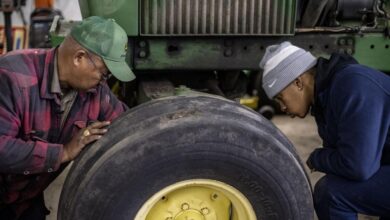
White: 142,905
Asian: 151
More than one race reported: 217
American Indian or Alaska Native: 81
Black or African American: 72
Native Hawaiian or other Pacific Islander: 21
Source: U.S. Census of Agriculture, 2017
The U.S. Department of Agriculture reported just 72 Black farmers in Iowa in 2017, the most recent Census of Agriculture. That was 0.05 percent of the total 143,447 producers the USDA counted in the state.
Nationwide, there were 45,508 Black farmers, which was 1.3 percent of nearly 4 million producers, the USDA reported.
National and state numbers may be underreported because some Black growers of vegetables and flowers may not consider themselves traditional farmers or they may not be on the USDA’s radar, officials said.
United States had more than 900,000 Black farmers in early 1900s
Still, the number of Black farmers today is a dramatic drop from the early 1900s, when more than 900,000 Black farmers owned about 15 million acres, mostly in the Southern states, but all across the country, said Valerie Grim, director of undergraduate studies, African American and African Diaspora Studies at Indiana University.
“In much of the early 20th century, there was a tremendous effort to run Black people off their land,” said Grim, who earned a Ph.D. in history at Iowa State University in 1990.
“You had violence and intimidation. The lynching of Black farmers was not uncommon in the Southern states. Sometimes you had situations where Black folks could not get the support they needed and may have lost their land through legal means.”
These days, farming is a tough business to get into, with entry costs of land, equipment, seed and fertilizer costing from $1 million to $5 million.
“For a guy to start out, this is a cash-intensive business,” said farmer Mike Cook, 64, of Waterloo. “If you don’t have an inheritance or something coming, I don’t know how you do it, even if you’re white.”
If you’re Black, Grim said, there are more hurdles, including institutional biases that favor farmers already part of the traditional agricultural system and little representation with powerful agricultural commodity groups.
Coming back to farming
Cook is a third-generation farmer in Black Hawk County. His grandfather on his dad’s side moved to Iowa from Water Valley, Miss., after retiring as a hostler for the Illinois Central Railroad, which ran from Chicago to New Orleans and from Chicago to Omaha.
McKinley Cook planted apple trees and grew vegetables, raised chickens and sold eggs, his grandson said.
“After a while, he decided he wanted to have more land and maybe get into the crops,” Cook said. “He bought 10 acres out in the Maywood area. He never really farmed that area. He sold that to my dad just before my dad got married. That’s where my dad used to farm.”
Cook’s father, Mack Cook, who died in 2015, farmed about 200 acres in the offseason of working at John Deere in Waterloo. Mike Cook helped out on the farm, but when he graduated from high school, he decided he was done with that.
“John Deere had a program called Homegrown Engineering,” Cook said of the program intended to recruit people of color into engineering. “They would pay for a year of your college and every summer you’d come back and work at John Deere to earn the money to go back to college.”
Cook headed to Southern University and A&M College, a historically Black land-grant college in Baton Rouge, La.
“It was the best thing ever for me to get out of Iowa to see how successful other Black people were,” he said. “I got a chance to be a majority person for a while.”
Cook graduated in 1980 with a mechanical engineering degree and worked for John Deere until he retired in 2008. But he couldn’t stay away from farming. In 1985, Cook planted sweet corn and used the proceeds to buy equipment for traditional row crops.
“The next thing I know, I’m farming 120 acres,” Cook said.
Cook grows corn and soybeans, as well as produce he sells at the Waterloo Urban Farmers Market from May to October.
“It was the best thing ever for me to get out of Iowa to see how successful other Black people were. I got a chance to be a majority person for a while.”
Discrimination in lending to Black farmers
When Congress passed the 2008 Farm Bill, it included $100 million for Black farmers who sued the government alleging the USDA discriminated against them in farm loans between 1981 and 1996. The USDA documented racist policies of denying loans, delaying loans and forcing foreclosures.
In 2010, President Barack Obama approved another $1.15 billion for these claims, the USDA reported.
“President Obama and I made a firm commitment not only to treat all farmers fairly and equally, but to right the wrongs in USDA’s past,” USDA Secretary and former Iowa Gov. Tom Vilsack said in a 2010 prepared statement. “I applaud those who took this historic step to ensure Black farmers who faced discrimination by their government finally receive justice.”
Cook was not a claimant in the settlement, but said he and his father both faced discrimination in farming because of their skin color.
“I had to pay cash for the land the house was on because the bank wouldn’t finance it,” Cook said.
Cook has added acres by picking up small parcels all over town that other farmers don’t want because it’s more efficient to use larger equipment on hundreds of contiguous acres. He was frustrated recently when land around his house came up for sale, but the real estate agent didn’t contact Cook about it.
“By the time they got back to me, they told me it was sold,” he said. “If you’re a farmer and you can’t get land, you can’t grow.”
Cook said his father had a white farming mentor who, if he felt Mack Cook was being cheated, would intervene and say, “Give him the same deal as you gave me.”
Cook also has mentors — mostly white men — who help him with best practices.
Doing something different
Holub, whose father is Black and mother is white, grew up on the farm of his maternal grandparents, Dorance and Mary Pat Holub, near Coggon. Climbing hay bales and playing with barn cats turned into mowing and driving the tractor to help with the 600-acre operation.
“When I graduated from high school, I was the only Black student there,” Holub said of North Linn High School. “One of my other good friends, from Korea, he was the only other minority there.”
Holub never felt like his path to becoming a farmer was any harder because he’s biracial.
“I walk into my local implement dealer, and they know who I am,” he said. “It might be more of a struggle potentially elsewhere, trying to start this type of operation not being the color people expect you to be.”
He remembers getting laughed out of his first meeting to apply for a USDA microloan, but that was because the loan officer didn’t know enough about organic farms that fulfill CSA (Community Supported Agriculture) orders and supply restaurants and grocery stores.
“I wasn’t doing the corn/soybeans — that’s what they were familiar with,” Holub said.
T.D. Holub looks over a high-tunnel greenhouse at his Farm near Coggon on Wednesday, February 16, 2022. Holub uses high-tunnel greenhouses to extend the vegetable growing season. (Nick Rohlman/The Gazette)
T.D. Holub looks over a partially completed high-tunnel greenhouse at his Buchanan County farm near Coggon on Wednesday, February 16, 2022. Nick Rohlman/The Gazette)
T.D. Holub seeds vegetable trays at his Buchanan County farm near Coggon on Wednesday, February 16, 2022. (Nick Rohlman/The Gazette)
Holub, who graduated from the University of Iowa in 2012, started Garden Oasis Farm in 2013 with a friend and half an acre of his grandparents’ lawn. He now rents 6.5 acres from his family and bought a 3.5-acre homestead he shares with his wife and daughters, Macynn, 3, and Natalie, 1 month.
Garden Oasis grows 40 types of vegetables to supply 100 CSA members with produce throughout the growing season. The Holubs sell produce to New Pioneer Food Co-op, which has stores in Cedar Rapids, Iowa City and Coralville, and to a handful of restaurants and caterers in Linn County, Holub said.
The Holubs have several high tunnel greenhouses, which allow them to extend their growing season from March through December. They also process 500 to 600 pasture-raised broiler chickens each year.
Righting wrongs
When it comes to righting wrongs for Black farmers, as Vilsack pledged in 2011, the American Rescue Plan Act, passed last year, included up to $4 billion to pay off federal farm loans to disadvantaged producers who are Black/African American, American Indian, Alaska Native, Hispanic/Latino, Asian American or Pacific Islander.
But in August, five white Texas farmers filed a lawsuit against the USDA saying the loan forgiveness violates the constitutional rights of white farmers and ranchers who also suffered financial challenges during the pandemic.
An injunction in federal court has halted loan payments for now — which is a shame, said Shaffer Ridgeway, the Black Hawk County-based district conservationist for the Natural Resources Conservation Service, a division of the USDA.
After all, “historically underserved farmers,” which include new, female, veteran and minority farmers, got just 3.6 percent of the $23 million in President Donald Trump’s trade aid program in 2018 and 2019, Reuters reported.
“Who got that money, and what was it for?” said Ridgeway, 44, who also farms.
He said the USDA has changed policies to no longer favor white farmers.
Grim agrees but noted USDA policies are implemented at the local level, where committee positions are largely held by white farmers. There also are few, if any, people of color on the boards of powerful state and national farm commodity groups.
“It isn’t that the USDA isn’t open to have having more Black farmers, but it’s outreach,” Grim said. “It’s also about building a pipeline.”
Ridgeway recently invited Cook, as well as Todd Western and Chris Western — Black brothers who are farming their mother’s land in Black Hawk County — to be among about a dozen farmers to learn about a new USDA trial to grow bluegrass between commodity crops.
“Regenerative agriculture is nothing new to Black farmers, nothing new to Indigenous people,” Ridgeway said. “We’ve been able to bring the Mike Cooks of the world into the USDA system to help them get better at what they’re doing.”
The Gazette will be following up with the farmers mentioned in this story and other Black farmers throughout the growing season, focusing on such topics as representation on state and local farm groups and how to recruit the next generation of Black farmers. If you have a suggestion of a farmer or other source we should contact, email Erin Jordan at erin.jordan@thegazette.com.
Comments: (319) 339-3157; erin.jordan@thegazette.com
–>
























































